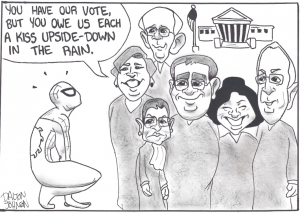
Spider-Man wins again. The Supreme Court ruling. The Court ruled in favor of Marvel Entertainment June 22 in a royalties dispute with inventor Stephen Kimble over a toy that allows Spider-Man fans to shoot foam webs.
Inventors cannot continue to receive royalties after the 20-year term of patent. The Supreme Court is not the place to determine the length of a patent, because Congress is responsible for legislation regarding patent laws.
The Supreme Court showed its sense of humor in writing the decision on.
“It is not uncommon for the court to sometimes get a little cute in writing opinions, taking popular culture and incorporating it into a court decision,” said Ben Whisenant, J.D., adjunct professor of media law and ethics at BYU and the University of Utah.
“We should exercise that authority sparingly,” Supreme Court Justice Elena Kagen said in her opinion response to Kimble’s appeal to overturn current patent law.”(I)n this world, with great power there must also come — great responsibility.” This was the first of several Spider-Man references made by Kagen.
Kagen went on to explain it was not reasonable for Kimble to collect royalties on a toy for “as long as kids want to imitate Spider-Man” by doing whatever a spider can.
“Both the majority and the dissent had reasonable arguments in the case,” Whisenant said. In 1990 Kimble filed to patent a toy that shoots foam webs from a glove. As part of the growing Spider-Man franchise, Marvel later created a toy similar to Kimble’s patented toy.
In 1997, in an attempt to protect his patent, Kimble sued Marvel for copyright infringement.
As Kimble’s patent approached the end of the 20-year term for patent, Marvel discovered a previous court ruling, Brulotte v. Thys, in which the court ruled that the patentee cannot continue to collect royalties after the 20-year term for patent. In an attempt to continue patent protection, Kimble appealed to the Supreme Court.
“In our age of rapid development and advancement, I think that many patents far outlive their use in those 20 years,” said Bryant Boyer, a BYU senior studying mechanical engineering, who hopes that for some sectors patent protection will be extended.
The court stated that “Congress legislates actively with respect to patents,” indicating the effect of further patent laws will be enacted by Congress.
“As an engineer, the invention/patent process is important to me because it’s the only way to protect our innovations,” Boyer said.
After Kimble’s fight to protect his patent, Marvel settled with Kimble for a large sum and promise of royalties on future sales of hand foam-shooting toys.
According to the court, patent laws exist to foster innovation by protection. However, Congress ensures that the protection remains only for a limited time so the public may benefit from new inventions.
“Given that patent(s) frequently deal with developments that are important advancements for society, it is understandable that the government is reluctant to extend their duration,” Whisenant said.




